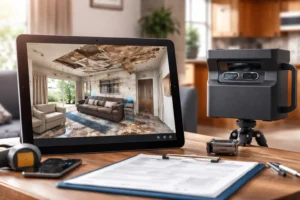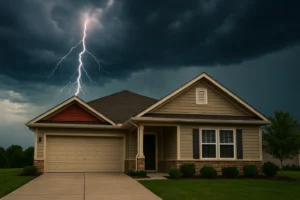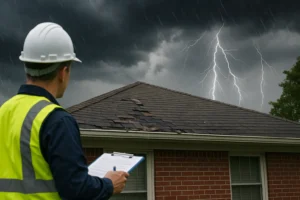Hurricanes are becoming more intense and frequent, and with this rise in storms comes the need for proper insurance coverage. According to projections, hurricane damage in the U.S. could cost $54 billion annually by 2050. For homeowners in hurricane-prone areas, it’s essential to secure the right insurance and understand what it covers to protect your home and finances.
Here’s a detailed guide on how hurricane damage insurance works and what you should consider when preparing your home and insurance for the next storm.
How Does Home Insurance Cover Hurricane Damage?
Homeowners insurance generally covers hurricane damage under two main areas: wind damage and its impact on your property. If high winds tear off your roof or send debris crashing through windows, your insurance will likely help cover repairs. However, coverage isn’t automatic for all types of damage, especially in hurricane-prone regions. Many states enforce specific rules, like hurricane deductibles, which can affect your claim.
What Is a Hurricane Deductible?
A hurricane deductible is the amount you’ll need to pay out-of-pocket before your insurance starts covering damages. Unlike regular deductibles, which are flat amounts, hurricane deductibles are often a percentage of your home’s insured value, typically ranging from 1% to 5%.
For instance, if your home is insured for $300,000 and your hurricane deductible is 3%, you’d need to cover the first $9,000 in damages before your insurer steps in. This might seem steep, but without it, you’d be responsible for much higher repair costs.
Does Homeowners Insurance Cover Flooding from a Hurricane?
Here’s where things can get complicated. While homeowners insurance usually covers wind damage, flooding caused by hurricanes is not included in most standard policies. This means damage from storm surges or heavy rainfall isn’t automatically covered.
To protect yourself from hurricane-induced flooding, you’ll need a separate flood insurance, often available through the National Flood Insurance Program (NFIP). Given that hurricanes frequently bring devastating floods, this coverage is essential for coastal homeowners.
How Much Hurricane Coverage Do You Need?
The amount of coverage you need depends on factors like your home’s value and where you live. Here’s a breakdown of key coverage areas to consider:
- Dwelling Coverage: Covers the structure of your home. Make sure it’s enough to rebuild your home entirely in case of destruction.
- Other Structures Coverage: Covers detached structures like garages or fences.
- Personal Property Coverage: Protects your belongings, from furniture to electronics.
- Additional Living Expenses (ALE): Helps pay for temporary housing and living expenses if your home becomes uninhabitable.
What States Have Hurricane Deductibles?
Hurricane deductibles are common in states along the Atlantic and Gulf Coasts, where hurricanes are frequent. These states include:
- Florida
- Texas
- Louisiana
- North Carolina
- South Carolina
- Alabama
- Mississippi
Each state has its own rules and regulations regarding hurricane deductibles, so it’s crucial to check with your insurance provider to understand how it applies to you.
Additional Hurricane Coverage Options to Consider
Aside from standard hurricane insurance, consider these optional riders or add-ons for enhanced protection:
- Ordinance or Law Coverage: Covers the cost of bringing your home up to current building codes after hurricane damage.
- Replacement Cost for Personal Property: Ensures that you’ll receive the current market value to replace damaged belongings, rather than the depreciated value.
What Hurricane Damage Is Covered by Homeowners Insurance?
Homeowners insurance usually covers wind damage from hurricanes. This includes damage to your home’s structure, roof, windows, and any harm caused by falling trees or flying debris. Additionally, certain policies may cover damage from downed trees blocking your driveway or paths.
What Hurricane Damage Is Not Covered by Home Insurance?
Flooding is the biggest exclusion in standard homeowners insurance. Water damage from storm surges or heavy rains won’t be covered unless you have flood insurance. Sewer backups caused by hurricanes also aren’t covered unless you add a specific rider.
Recommended Insurance for Coastal Homes
If you live in a coastal area, standard homeowners insurance may not be enough. Consider adding:
- Windstorm Insurance: Some policies exclude wind damage in hurricane-prone regions, making this coverage essential.
- Flood Insurance: Don’t underestimate the potential for flooding, even if you’re inland. Hurricanes often cause flooding miles away from the coast.
How to Stay Prepared for Hurricane Season
Insurance is just one aspect of hurricane preparedness. Here are additional steps you can take:
- Review Your Insurance Annually: Don’t wait until hurricane season to discover gaps in your coverage.
- Document Your Belongings: Keep an updated inventory of your possessions, including photos and receipts.
- Upgrade Your Home: Install hurricane shutters, reinforce your roof, and secure outdoor items to reduce damage.
FAQs on Hurricane Damage Insurance
A hurricane deductible is a percentage of your home’s value, while a regular deductible is a flat amount.
Yes, if your home is uninhabitable, Additional Living Expenses (ALE) coverage helps with temporary housing.
If you live in a hurricane-prone or coastal area, flood insurance is highly recommended.
Renters insurance covers personal belongings but not the building structure. Flood insurance is still needed for belongings damaged by flooding.
Yes, if the tree causes damage or blocks access to your home, but not for simple removal.
Some insurers offer discounts for reinforcing your home. Check with your provider for potential savings.
Conclusion
Hurricane damage can be devastating, but with the right insurance and preparation, you can protect your home and finances. Review your insurance carefully, consider additional coverage like flood insurance, and stay informed on how your deductible works. With these measures in place, you’ll be better equipped to weather any storm.






